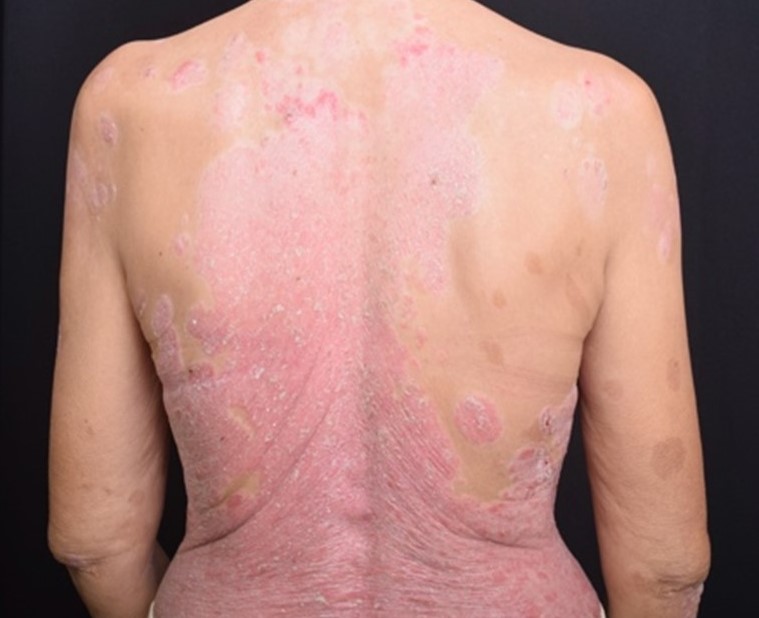Dual Improvements in Dermatological Symptoms and Psychological Well-Being of Psoriasis Patients After Treatment with a Single Dose of Secukinumab: Three Case Reports
Keywords:
Psoriasis, Secukinumab, Interleukin-17 antagonist, Psychological well-being, Depression, Quality of lifeAbstract
Psoriasis is a chronic inflammatory skin condition that significantly impacts the physical and psychological well-being of affected individuals. It is characterized by well-demarcated, erythematous plaques with a white scaly surface. Beyond its dermatological manifestations, psoriasis is associated with systemic comorbidities, including arthritis, metabolic syndrome, cardiovascular diseases, and notably, psychological disorders such as depression and anxiety. We report a case series of patients suffering from moderate to severe psoriasis with concurrent mild to moderate depression. Patients administered with a single dose of 300 mg secukinumab, an interleukin-17 antagonist, showed significant improvements in psoriasis symptoms, quality of life, and depression levels within an 8-week period. This dual benefit underscores the importance of an integrated approach to managing patients with psoriasis, addressing both dermatological and psychological aspects.
References
Menter A. Psoriasis and psoriatic arthritis overview. Am J Manag Care 2016;22:s216-24.
Sewerin P, Brinks R, Schneider M, Haase I, Vordenbäumen S. Prevalence and incidence of psoriasis and psoriatic arthritis. Ann Rheum Dis 2019;78:286-7.
Blackstone B, Patel R, Bewley A. Assessing and improving psychological well-being in psoriasis: considerations for the clinician. Psoriasis (Auckl) 2022;12:25-33.
Rigas HM, Bucur S, Ciurduc DM, Nita IE, Constantin MM. Psychological stress and depression in psoriasis patients-a dermatologist's perspective. Maedica (Bucur) 2019;14:287-91.
Kulthanan K, Jiamton S, Wanitpahakdeedecha R, Chanthrujikaphong S. The validity and reliability of the Dermatology Life Quality Index (DLQI) in Thais. Thai J Dermatol 2004;20:113-23.
Pattanaphesaj J, Thavorncharoensap M, Ramos-Goñi JM, Tongsiri S, Ingsrisawang L, Teerawattananon Y. The EQ-5D-5L valuation study in Thailand. Expert Rev Pharmacoecon Outcomes Res 2018;18:551-8.
Lotrakul M, Sumrithe S, Saipanish R. Reliability and validity of the Thai version of the PHQ-9. BMC Psychiatry 2008;8:46.
Zill JM, Dirmaier J, Augustin M, et al. Psychosocial distress of patients with psoriasis: protocol for an assessment of care needs and the development of a supportive intervention. JMIR Res Protoc 2018;7:e22.
Timis TL, Beni L, Mocan T, Florian IA, Orasan RI. Biologic therapies decrease disease severity and improve depression and anxiety symptoms in psoriasis patients. Life (Basel) 2023;13:1219.
Bulat V, Šitum M, Delaš Aždajić M, Lovrić I, Dediol I. Study on the impact of psoriasis on quality of life: psychological, social and financial implications. Psychiatr Danub 2020;32:553-61.
Tribó MJ, Turroja M, Castaño-Vinyals G, et al. Patients with moderate to severe psoriasis associate with higher risk of depression and anxiety symptoms: results of a multivariate study of 300 Spanish Individuals with psoriasis. Acta Derm Venereol 2019;99:417-22.
Elsayed M, Connor CJ. Beneath the Skin: The relationship between psychological distress and the immune system in patients with psoriasis. EMJ Dermatol 2018;6:108-17.
Talamonti M, Malara G, Natalini Y, et al. Secukinumab improves patient perception of anxiety and depression in patients with moderate to severe psoriasis: A post hoc analysis of the SUPREME study. Acta Derm Venereol 2021;101:adv00422.

Downloads
Published
How to Cite
Issue
Section
License
Copyright (c) 2024 Thai Journal of Dermatology

This work is licensed under a Creative Commons Attribution-NonCommercial-NoDerivatives 4.0 International License.
เนื้อหาและข้อมูลในบทความที่ลงตีพิมพ์ในวารสารโรคผิวหนัง ถือเป็นข้อคิดเห็นและความรับผิดชอบของผู้เขียนบทความโดยตรงซึ่งกองบรรณาธิการวารสาร ไม่จำเป็นต้องเห็นด้วย หรือร่วมรับผิดชอบใดๆ
บทความ ข้อมูล เนื้อหา รูปภาพ ฯลฯ ที่ได้รับการตีพิมพ์ในวารสารโรคผิวหนัง ถือเป็นลิขสิทธิ์ของวารสารฯ หากบุคคลหรือหน่วยงานใดต้องการนำทั้งหมดหรือส่วนหนึ่งส่วนใดไปเผยแพร่ต่อหรือเพื่อกระทำการใดๆ จะต้องได้รับอนุญาตเป็นลายลักอักษรจากบรรณาธิการวารสารโรคผิวหนังก่อนเท่านั้น


